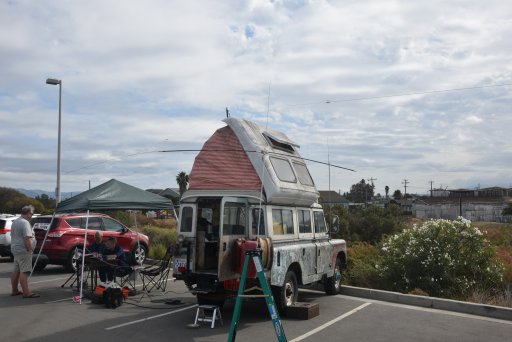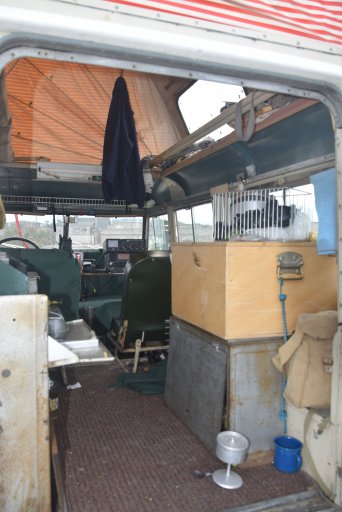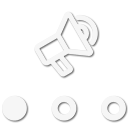OB Approved So You Want To Be A HAM? (US Edition)
- Thread starter Lars
- Start date
-
Forum Upgrades: Whats Going On? Video

Influencer II
- 3,135
- First Name
- Lyon
- Last Name
- McKeil
- Member #
-
4052
- Ham/GMRS Callsign
- AI6F WQZP709 M0GVK (UK Ham Licesne)
- Service Branch
- CAL FIRE
I have been looking at getting my HAM licence, a part of why is not only for Overlanding, but I also work for an ambulance service and it would be nice to have the ability to use a HAM in an emergency. I have found https://www.hamradiolicenseexam.com/ and was wondering if any of the HAM operators on here have heard of or used this test prep service. If not are there any recommendations for good test prep, also for someone like me who may need to use the emergency frequency's, what licence level should I go for?
Sorry Tyler, I have no first hand experience with the site you listed. I have however used the Gordon West CDs, and Practice tests on QRZ.comI have been looking at getting my HAM licence, a part of why is not only for Overlanding, but I also work for an ambulance service and it would be nice to have the ability to use a HAM in an emergency. I have found https://www.hamradiolicenseexam.com/ and was wondering if any of the HAM operators on here have heard of or used this test prep service. If not are there any recommendations for good test prep, also for someone like me who may need to use the emergency frequency's, what licence level should I go for?
At the bottom of the first post is a section on "How Can You Get Licensed:" and "Training/Study Materials:"
Thank you @Lars.Sorry Tyler, I have no first hand experience with the site you listed. I have however used the Gordon West CDs, and Practice tests on QRZ.com
At the bottom of the first post is a section on "How Can You Get Licensed:" and "Training/Study Materials:"
@Tyler Higgins Looks like @Radiola has first hand experience with the site you asked about. :)
As a general class amateur radio operator I have to put my two cents in here getting your technicians class license is very easy and cheap it's 15$ for the test and if you pass you can opt to take the general test on the same day at no cost and if you pass that one you can opt to take the extra on the same day free again, I took all three but only passed the tech and general test the extra is a bit more daunting and I am still working on that but I only spent about two weeks studying so. I used the following site for my studies, I just got all three https://www.hamradiolicenseexam.com/ ( I have no afflation with them and am not making any money off linking their site) so when I add up the cost including the new baofeng radio I am all in for $134.85
so less than the cost of a new tire and you are legal.
again just my two cents...... and I forgot to add that you don't need to know morse code any more
. .- ... -.--

Influencer II
- 3,135
- First Name
- Lyon
- Last Name
- McKeil
- Member #
-
4052
- Ham/GMRS Callsign
- AI6F WQZP709 M0GVK (UK Ham Licesne)
- Service Branch
- CAL FIRE
Hello Tyler, I think Lars is right. QRZ is free to register and they don't "sell" your info. I used the ARRL books, but Gorden West, who I have met several times, puts out some good books as well (I used his book for the GROL/RADAR license).I have been looking at getting my HAM licence, a part of why is not only for Overlanding, but I also work for an ambulance service and it would be nice to have the ability to use a HAM in an emergency. I have found https://www.hamradiolicenseexam.com/ and was wondering if any of the HAM operators on here have heard of or used this test prep service. If not are there any recommendations for good test prep, also for someone like me who may need to use the emergency frequency's, what licence level should I go for?
Dude!! Me too. I think this is a great resource.Thanks for posting this, it reminded me to finally take my technician test. I've been staring at my baofung for way too long [emoji38]

Advocate III
How many people use these in their overland rigs versus a CB? Also, and this may be a really stupid question but ... can a HAM communicate with someone who only has a CB?
Thanks
Thanks

Pathfinder III
- 5,200
- First Name
- Kent
- Last Name
- Reynolds
- Member #
-
1632
- Ham/GMRS Callsign
- K6KNT
- Service Branch
- Retired Firefighter
Depending on who I am running with, I only use the CB if that is the common radio. I do prefer Ham. I spent last week trail riding in moab and even in the fairly open terrain, I did notice a wide range of transmit and receive issues with the groups of 10ish trucks. Fairly frequent "tailgunner, do you copy?" followed by silence. There were usually 2-3 hams in the group and we would be the ones relaying info from the front or the back.How many people use these in their overland rigs versus a CB? Also, and this may be a really stupid question but ... can a HAM communicate with someone who only has a CB?
Thanks
And no, the ham frequencies are not the same as CB frequencies.

Enthusiast II
This is an excellent topic for Overlanding. I can't say enough about how important it is to have communications, both within the group and outside. In the event of a serious injury, you need to be able to communicate with someone for medevac. And if everything is going well and you want to extend your trip, you need to let someone in your network know that your are alright and your new ETA. you don't want someone calling for a search and rescue operation only to find you kicking back by a lake drinking beer. It happens!
I have three radios (four if you count the Sat Phone) I take into the back country. The main radio in my 2011 JKUL Rubicon is a Icom 7000. It literally does everything on HF, VHF, and UHF, but my interests are FM, SSB and CW. On the road, I'm using VHF. I'm seeing more groups using the 2 meter band for intergroup communications, but at the base camp I prefer setting up an external antenna and doing HF. Lately, on longer trips, I have used Satellites to friends back home. I made a handheld circularly polarized antenna and had some great QSOs.
I have a CB for when I'm with groups that don't have VHF. I actually have two radios, a COBRA vehicle mounted radio with SSB, and Hand held with weather. I also have a Yaesu VX-8 which we use for dismounted explorations. We always leave someone with the vehicles, which act as our base camp. While dismounted, we communicate with the base using the Yaesu. This also has APRS which ensures we don't get lost.
The amateur radio community is great. If you need help, they are there, whether in a natural disaster or calling for a broken part in the back country, they can be relied upon to forward the message to get you the help you need. Hope to see you or hear you on the trail.
KJ6KYQ 73's
I have three radios (four if you count the Sat Phone) I take into the back country. The main radio in my 2011 JKUL Rubicon is a Icom 7000. It literally does everything on HF, VHF, and UHF, but my interests are FM, SSB and CW. On the road, I'm using VHF. I'm seeing more groups using the 2 meter band for intergroup communications, but at the base camp I prefer setting up an external antenna and doing HF. Lately, on longer trips, I have used Satellites to friends back home. I made a handheld circularly polarized antenna and had some great QSOs.
I have a CB for when I'm with groups that don't have VHF. I actually have two radios, a COBRA vehicle mounted radio with SSB, and Hand held with weather. I also have a Yaesu VX-8 which we use for dismounted explorations. We always leave someone with the vehicles, which act as our base camp. While dismounted, we communicate with the base using the Yaesu. This also has APRS which ensures we don't get lost.
The amateur radio community is great. If you need help, they are there, whether in a natural disaster or calling for a broken part in the back country, they can be relied upon to forward the message to get you the help you need. Hope to see you or hear you on the trail.
KJ6KYQ 73's

Enthusiast II
I can't agree enough! The first responsibility of the driver is to drive. If you are trying to climb a hill or navigate difficult terrain you are busy enough. Having you copilot use the radio both frees you up to drive and keeps the screaming down (Just kidding on the screaming).If you are going to be a HAM get your significant other involved too. My wife is a HAM as well, so when I put radios on the "kitchen" table she doesn't mind.
View attachment 18039
The technician exam is easy enough that my wife and son, with no readily or electrical experience, took a 3 hour class at An ARRL convention, passed the technician class license on the first try. Now Tracy is my navigator and radio operator on the road.
With my wife more involved and actively participating in the sport, it's another thing with share and enjoying doing together.
Hope to see, or at least hear you on the trail! 73's
Mike
KJ6KYQ
Sent from my iPad using OB Talk

Member III
And you don't have to know those things to use FRS or CB either, that's why they aren't licensed. Amateur radio lets people access so much more power and equipment that the dedication to learn those things is used to "weed out the weak" so to speak.First this post is not to offend any Hams, but I think the Technician license is way too technical for the normal person . It should focus more on the rules than electronic knowledge, especially for 2M, this keeps alot of folks from entering the hobby. You dont need to know how to read a schematic with electronic symbols , OHMs law,and theory to key a mic. Its like saying to get a drivers license I should be able to explain the principles of a combustion engine and identify all the parts. Again this post is not to offend.
My Great Aunt got her tech license when you still had to know Morse code...
You don't need to know electronics I got my wife a licence. There are apps that have all the questions she did that for two weeks and passed.What I am saying is it should be about following the rules more than having a degree in electronics to pass a test, HF I can understand to be more qualified, but 2M seriously ? Weed out the weak?

Influencer II
- 3,135
- First Name
- Lyon
- Last Name
- McKeil
- Member #
-
4052
- Ham/GMRS Callsign
- AI6F WQZP709 M0GVK (UK Ham Licesne)
- Service Branch
- CAL FIRE
Yes, a copilot is invaluable. She usually takes all the Comms duties, from radios to cell phones. I spend my time driving the car.I can't agree enough! The first responsibility of the driver is to drive. If you are trying to climb a hill or navigate difficult terrain you are busy enough. Having you copilot use the radio both frees you up to drive and keeps the screaming down (Just kidding on the screaming).
The technician exam is easy enough that my wife and son, with no readily or electrical experience, took a 3 hour class at An ARRL convention, passed the technician class license on the first try. Now Tracy is my navigator and radio operator on the road.
With my wife more involved and actively participating in the sport, it's another thing with share and enjoying doing together.
Hope to see, or at least hear you on the trail! 73's
Mike
KJ6KYQ
Sent from my iPad using OB Talk
I'm a Volunteer Examiner (we give ham radio license tests). The youngest person I signed off on was a 9 year old girl. So, if a bright 9 year old can get a ham license, most anyone can get a ham license.
One of the folks I wheel with simply carries a couple of extra Baofengs so that he can hand a programmed, locked radio to someone who otherwise would not be able to communicate with the group. There is probably some room for debate on the legality of that. The responsible, licensed ham is not in the same vehicle as the user, but is not far away either. I don't know where the FCC draws that line.Thanks for this thread! In the Sierra Foothills we are trying hard to get everyone on Ham but the reality is you still need a CB for that one person on the trail that refuses to upgrade and you still need to talk to them.
One major benefit of dual band radios that I have not seen mentioned here is the ability to set up the group with one frequency for banter and another frequency for instructions from the trail boss. An OHV/Ham group that I wheel with runs this way. But banter is a big part of their group culture.
As to test difficulty and youngsters, Varmint #1 got his license at 11. It really is not difficult at all. For a youngster the biggest hurdle is knowing enough math to know how to solve for a variable. Anyone who has graduated high school should have the math skills. Beyond that it is just a matter of learning about some basic rules so that you don't mess up the airwaves for other users.
For those who are going to venture beyond the range of their cell phones ham radio is a valuable communication tool.

Member III
The FCC clearly draws the line in the law that the control operator (your licensed friend) should be in control of the radio at all times. He should be able to power it off or make adjustments to it from his location.One of the folks I wheel with simply carries a couple of extra Baofengs so that he can hand a programmed, locked radio to someone who otherwise would not be able to communicate with the group. There is probably some room for debate on the legality of that. The responsible, licensed ham is not in the same vehicle as the user, but is not far away either. I don't know where the FCC draws that line.
One major benefit of dual band radios that I have not seen mentioned here is the ability to set up the group with one frequency for banter and another frequency for instructions from the trail boss. An OHV/Ham group that I wheel with runs this way. But banter is a big part of their group culture.
As to test difficulty and youngsters, Varmint #1 got his license at 11. It really is not difficult at all. For a youngster the biggest hurdle is knowing enough math to know how to solve for a variable. Anyone who has graduated high school should have the math skills. Beyond that it is just a matter of learning about some basic rules so that you don't mess up the airwaves for other users.
For those who are going to venture beyond the range of their cell phones ham radio is a valuable communication tool.






